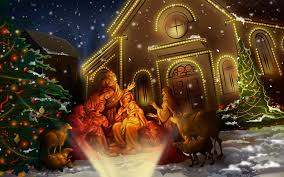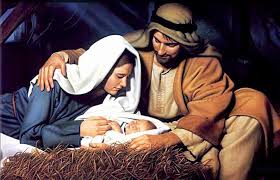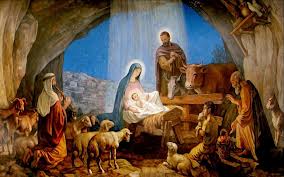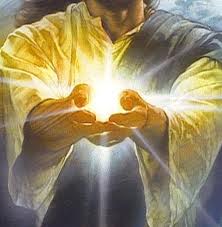
-To be celebrated at Midnight/ Dawn 24/25th December 2024-
Gospel reading Vigil Mass: Luke 2:1-14,
vs.1 Caesar Augustus issued a decree for a census of the whole world to be taken.
vs.2 This census – the first – took place while Quirinius was governor of Syria,
vs.3 and everyone went to his own town to be registered.
vs.4 So Joseph set out from the town of Nazareth in Galilee and travelled up to Judaea, to the town of David called Bethlehem, since he was of David’s House and line,
 vs.5 in order to be registered together with Mary, his betrothed, who was with child.
vs.5 in order to be registered together with Mary, his betrothed, who was with child.
vs.6 While they were there the time came for her to have her child,
vs.7 and she gave birth to a son, her first-born. She wrapped him in swaddling clothes and laid him in a manger because there was no room for them at the inn.
vs.8 In the countryside close by there were shepherds who lived in the fields and took it in turns to watch their flocks during the night.
vs.9 The angel of the Lord appeared to them and the glory of the Lord shone round them. They were terrified,
vs.10 but the angel said, “Do not be afraid. Listen, I bring you news of great joy, a joy to be shared by the whole people.
vs.11 Today in the town of David a saviour has been born to you; he is Christ the Lord.
vs.12 And here is a sign for you: you will find a baby wrapped in swaddling clothes and lying in a manger.”
vs.13 And suddenly with the angel there was a great throng of the heavenly host, praising God and singing:
vs.14 “Glory to God in the highest heaven, and peace to men who enjoy his favour.”
Dawn Mass Luke: 2:15-20
vs.15 Now when the angels had gone from them into heaven, the shepherds said to one another, “Let us go to Bethlehem and see this thing that has happened which the Lord has made known to us.”
vs.16 So they hurried away and found Mary and Joseph, and the baby lying in the manger.
 vs.17 When they saw the child they repeated what they had been told about him,
vs.17 When they saw the child they repeated what they had been told about him,
vs.18 and everyone who heard it was astonished at what the shepherds had to say.
vs.19 As for Mary, she treasured all these things and pondered them in her heart.
vs.20 And the shepherds went back glorifying and praising God for all they had heard and seen; it was exactly as they had been told.
The Gospel of the Lord Praise to you Lord Jesus Christ
**************************************************************
We have three commentators available from whom you may wish to choose .
Michel DeVerteuil : A Trinidadian Holy Ghost Priest, director of the Centre of Biblical renewal .
Thomas O’Loughlin:Professor of Historical Theology, University of Northamton.
Fr John Littleton: Director of the Dominican Distant Learning institute, D 2
************************************************************************
Michel de Verteuil
Lectio Divina, The Year of Luke
www.columba.ie
General Comments
This well-known story is very rich so we will focus on some aspects only, staying with Mary’s perspective, especially in verses 6 to 7, and 16 to 20.
In verses 6 and 7 Luke tells us that Mary gave birth “when the time came for her to have her child.” Contrary to the popular interpretation, he indicates no regret that there was no room in the inn. All happened as was foretold.
To understand the significance of verse 19, it is important to note that the Greek word which we translate as “things” is rhema, which means both “word” and “event”. Mary, through her interior attitude of respectful listening, turns the event into a sacred word.
Prayer Reflection
“Nothing happens before its time.” … ol’ Trinidadian saying
Lord, we pray for those who are involved in lofty projects and are becoming impatient:
* parish youth leaders who are not getting co-operation;
* a new party that has won no seats in the elections;
* parents who are trying in vain to dialogue with their teenagers.
Help them to remember Mary and how when the time came
For her to have her child she gave birth to a son.
She was at peace, felt no great concern that there was no room for them in the inn,
Merely wrapped her child in swaddling cloths and laid him in a manger.
Lord, these days we are all very busy.
At work or in school we have to expend much effort to achieve success.
At home we are bombarded with information from television and radio.
We have time only for the sensational and we allow the ordinary events of life to come and go:
~ the signs of maturity in our children;
~ the life crises of those close to us;
~ new stirrings of resentment or of hope among ordinary people in our country.
Even in our relationship with you we concentrate on the miraculous
and the extraordinary, glorify and praise you
because things turn out exactly as we were told they would.
Mary teaches us on the contrary to see in every event a call to grow,
a sacred word you speak to us, to be welcomed as a treasure and pondered in our hearts,
reflected on and integrated into our consciousness.
Lord, help us to be more like Mary.
“My cell will not be one of stone or wood, but of self-knowledge.” …St Catherine of Siena
Lord, we thank you for all the contemplatives in the world,
those in enclosed convents, and those called, like Mary,
to live in their families and in secular surroundings.
While others chatter and repeat endlessly what they have been told, these, like Mary, know how to be silent,
treasuring things and pondering them in their hearts.
***********************************************************
3. Thomas O’Loughlin,
Liturgical Resources for Year C (Luke)
www.columba.ie
Homily Notes
Christmas Vigil Mass
1. The homily today always seems to be inadequate: the festival is bubbling over with symbols of the season (holly, ivy, ‘Santa, and what not) and with people’s heightened emotions on the big day. Moreover, the mystery that one has to speak about is so much more than anything capable of being put into words that anything actually said seems paltry and trite. Yet the day still needs a word. The day needs to have its focus drawn to the mind as well as to the senses. And, there may be many there in the assembly today who will never hear the word from one end of the year to the other, and to them alone is owed the duty of preaching. The task is to take the theme of God-with-us and present it in such a way that
(1) the homily can be followed using a framework already familiar to the audience;
2) that seems appropriately seasonal; and
3) that has a certain lightness suited to holiday time.
2. Here is a strategy that can produce a short homily that is easy to follow. The individuals who make up the congregation are asked to imagine where they stand in the array of people that are mentioned in the Bethlehem scene.
3. Do you imagine yourself as one of the people inside the inn?
For this group the birth of Jesus is an irrelevance: it does not touch them and they show no interest. To them it was just an external knock on the door, and they just kept going on with what they were doing.
Then as now, this is the majority of people.
4. Do you place yourself among the shepherds? Here are people who are open to wonder. They can accept good news. They are people who are already part of a faith tradition, they shared the practices, hopes, and fears of the people, but were also ready to respond with faith to the voice of God.
5. Do you imagine yourself as one of the wise ones, the kings, who came from the east? These are people who are dedicated to searching out the great human questions, but they are not just engaged in idle speculation: they set out and searched for the truth. They listened to the promptings of conscience; they did not come empty handed. These are dedicated searchers after the truth and conscientious doers of the good. All their talents they are placing in the service of God-with-us.
6. Do you imagine yourself like Joseph: caring for the welfare of the church, working in the community, taking on special responsibilities towards the Word made flesh. He is helping to make the good news known, and prepared to response to the inner call of vocation.
7. Do you imagine yourself as sharing in the vocation of Mary? She first brought the Anointed One into the world; but it is through us that Jesus enters our world.
8. Do you imagine yourself as the new born baby in a new environment – trusting and dependant on and trusting in your Father, Mary and Joseph, and everyone around you.
8. We are all at the birth scene: each of us is called upon to fulfil all these vocations in varying ways.
Christmas Day Mass
1. The homily today has to be simple, snappy, and seasonal.
The reason for this is obvious: there are many in the gathering who are not frequent diners at the eucharistic table, and for virtually everyone there are lots of other things going through their minds such as what’s going to happen at lunch, keeping an eye on children with new toys, or how not to get annoyed with the in-laws.
2. So the homily has to have the inclusiveness of a ‘Thought for the Day‘ on the radio, yet adequately identify the Christian solemnity we are celebrating. One way to do this is to focus on the Christ as the Prince of Peace.
3. Look at the coming of the Son of God: not in a show of force but in simplicity and poverty.
4. The majesty of God makes itself felt by sharing human weakness, limitation and suffering, not by making humans feel his majesty and power.
5. Fear and threats are marks of human relations at every level; the message of the angels to the shepherds is peace on earth, good will to men and women.
6. We celebrate the Prince of Peace. Are we willing to adopt the way of peace ourselves?
We seek security and justice. Are we brave enough to be peacemakers?
7. We are celebrating God sharing his life with us in Jesus; we have gathered for the Lord to share his table with us; are we willing to share our lives and tables and riches with others: for that is how peace and justice are established?
*********************************************************
3. John Littleton,
Journeying through the Year of Luke.
www.columba.ie
Gospel Reflection
Christmas has finally Come. We rejoice that the Worn has become flesh, that God the Son has become human while remaining divine. There is no more waiting because the Messiah has arrived and now is the time liberation from our enslavement to sin. But this is n surprising since, in the Hebrew Scriptures ( Christians call the Old Testament), this arrival had been prophesied for many centuries before the birth of Christ.
 The prophets taught that God would intervene dramatically in human history, redeeming his people by defeating the power of sin, thereby bringing an end to oppression and injustice (which are some of the consequences of sin), and by establishing freedom, peace and happiness. God would send the Saviour to rescue his people from their long-lasting trials and tribulations. As a result, the world and human life would never again be the same.
The prophets taught that God would intervene dramatically in human history, redeeming his people by defeating the power of sin, thereby bringing an end to oppression and injustice (which are some of the consequences of sin), and by establishing freedom, peace and happiness. God would send the Saviour to rescue his people from their long-lasting trials and tribulations. As a result, the world and human life would never again be the same.
In Isaiah’s words the prophecy was definite: ‘For there is a child born for us, a son given to us and dominion is laid on his shoulders; and this is the name they give him: Wonder-Counsellor, Mighty-God, Eternal-Father, Prince-of-Peace. Wide is his dominion in a peace that has no end’ (Isaiah 9:5-7). This particular prophecy is one of the most important messianic prophecies in the Hebrew Scriptures.
The prophecy was fulfilled at the Incarnation and the birth of Jesus. He is the ‘Son of the Most High’ (Luke 1:32) who was destined to be the Saviour of the world. He is the light that came into the world casting away the darkness of sin and cancelling human estrangement from God (see John 1:9).
We are the descendants, both historically and spiritually of the many generations of people who ‘walked in darkness’ (Isaiah 9:1) for centuries as they waited and prepared for the Messiah’s arrival. Sadly, we become lost in spiritual darkness whenever our lives are sinful. Our challenge at Christmas is to abandon sin and invite the light of Christ to shine in our lives.
When, with the light of God’s grace, we overcome the darkness of sin, we are able to contribute to the ending of oppression and injustice in our world. That is what Jesus meant when, during his public ministry
thirty years after his birth, he advised his disciples: ‘Set your hearts on his kingdom first, and on his righteousness, and all these other things will be given you as well’ (Matthew 6:33). Yet there is much disharmony and violence in our world. This is because countless numbers of people have not accepted Jesus as the Messiah and have not responded to his life- giving and redemptive message.
Christmas is a time for both giving and receiving gifts. The greatest gift that God gives us is sending his only Son among us to redeem us from the effects of sin. Christmas celebrates the reality that God is with us uniquely in and through Jesus Christ.
We are encouraged at Christmas to renew our hope in God because he has intervened spectacularly in history, particularly by becoming human, to save us from sin and death. Christmas is about life and light — the life offered us in Christ and his light which destroys the spiritual darkness of sin. We rejoice and are glad that he lives among us.
Meditation
Today in the town of David a saviour has been born to you;
He is Christ the Lord. (Luke 2:11)
**************************